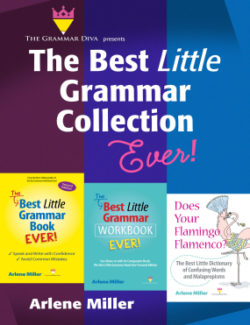Many times we talk about grammar in terms of writing. This blog post is about speaking. We don’t need to worry about punctuation when we speak, but we do have to worry about  grammar—and pronunciation (which we don’t have to worry about when we write).
grammar—and pronunciation (which we don’t have to worry about when we write).
Here are ten of the most common speaking gaffes:
- Using a pronoun directly after the noun it refers to: My brother he is visiting from Boston. Please take out he. My brother is visiting from Boston.
- I don’t is correct. But he don’t, she don’t, and it don’t are not! It’s doesn’t.
- Please don’t get your past participles wrong. The English language is tricky, with so many irregular verbs, but please try to learn them. It isn’t have/has went. Ever!!! It is has/have gone. Likewise, it is have written (not wrote), have eaten (not ate), have spoken (not spoke), have fallen (not fell), have rung (not rang), have swum (not swam)….and there are others.
- Mischievous is spelled that way because that is the way it is pronounced. It is not spelled mischeevious, and it is not pronounced that way either. The accent is on the first syllable, and there is no i in the final syllable.
- Width ends in a -th. Height ends in a -t. It is not heighth.
- Oh, please don’t say ain’t. Yes, it is in the dictionary, but so is irregardless.
- This is probably a dialect issue, but please don’t drop your -ing endings to be -in endings. I am going, not goin’.
- Many of the grocery stores have now gotten less and fewer correct, so you should too. Less is used for singular nouns and things that cannot be counted. Fewer is used for plurals and things that can be counted: Less money. Fewer pennies. Less salt. Fewer teaspoons of salt. Less stuff. Fewer than 12 items. The same is true of number and amount. Number is used with plurals. Amount is used for singulars and things that can’t be counted. Number of pennies. Amount of money. Number of doughnuts. Amount of pastry.
- Avoid using double negatives. Most of us avoid things like I don’t have no money, but remember that barely, scarcely and hardly are also negatives. I don’t barely have enough money is a double negative. I can’t hardly stand it is a double negative. You haven’t scarcely eaten a thing is a double negative.
- Realtor and jewelry are often mispronounced. They are usually pronounced with three syllables, but they each have only two. It is not jew-la-ry. It is jewel-ry. It is not re-la-tor. It is real-tor.
And while we are on the subject, please put that first R in February!
Grammar Diva News
Launch Event for The Best Little Grammar Collection Ever! Copperfield’s Books in Petaluma, CA: Friday, March 16 at 7 p.m.
My two new books are available….





Hi Arlene –
Great post!
Your mention of “real-a-tor” for “realtor” brings me to a list of mispronounced occupations that I’ve been mentally compiling, e.g.:
athlete (ath-a-lete)
nuclear engineer (etc.) (nu-kyu-ler)
realtor (real-a-tor)
restaurateur (inserting an “n”)
Thanks, Rosina, Interesting list of occupations. Let me know how many you get!
I do not use “ain’t.” However, I recognize that it is a part of the language IN SOME CIRCLES.
Which brings me to my comment: The reason we write is so others can read what we have written. Given that basic fact, it does not make sense to write in the style we think is right. That is me-centred thinking. It makes sense to write in the style that is most comfortable and least distracting for the reader.
There is a world of difference in the spelling and grammar used in an academic thesis submitted to earn a PhD vs. an e-mail sent to a drinking buddy.
I hope we all keep this in mind when we read lists of “right” vs. “wrong” grammar.
I agree with you that there are different types of writing and speaking and that we need to keep our audience in mind. Usually, when I talk about grammar, I am talking about formal writing and speaking standards. And I am one of those people who think we need those standards.
And “have drunk,” “has drunk,” etc.
Thanks. Another good one! Not have drank!
You know grammar what about the 1000 of children who speak Ebonics, it’s a language it has it’s own rules syntax. African-Americans learn to code switch, it is a very helpful skill.
Ebonics is a dialect, but I wouldn’t use it for a college essay. We all need to conform to standard English for certain things. My opinion.
When speaking be careful not to use “and” or “so” or other filler words that create run-on phrases and/or sentences.
Thanks for the comment. I it wise not to use filler words. However, words like and or so are conjunctions so they don’t actually cause run-ons in a grammatical sense.
Thank you Arlene. I am gonna eat now. Oops, I am going to eat now.
Thank you for the comment! 🙂
#1 brought back a memory from a LONG time ago. Every time a student would say something like, “My brother he…”, my 6th-grade teacher would say, “Your brother he? Are you sure it’s not your brother she?” Got the point across and I’ll bet there are a lot of his students who still remember that.
Good point! Yup, I heard it a lot in elementary school too!
Thank you for the refresher course on common mistakes made in English. These are all mistakes that I point out in the course of teaching my private students English. May I use your article for teaching them?
You may certainly use the article for your students! Thank you.
Please add the following. I cringe when people say did-dent , could-dent, or
would-dent.
You added it for me! Thanks for the comment!
Although I have never heard some of these mispronunciations, your points are well taken. Remember, however, that sometimes regional dialects are a badge of pride. In South Philly tomorrow, people gonna be rootin’ fer the Iggles and you’s can’t stop us braggin if the Iggles win! E-A-G-L-E-S, IGGLES!
You can call them whatever you want….but I am originally from Boston, so if I were a football fan — which I am not — I would be rooting for the Pats! But your point is well taken, and regional dialects are important and to be valued.
Excellent. Thank you.
You are very welcome! Thank you for the kind words.
A lot to remember. All worthwhile. During the next few weeks I will focus on pronouncing the first r in February. Thanks,
And don’t forget the first r in library!!!!!! 😉
Wow, “less and fewer” and “number and amount” weren’t on my radar. They are now.
🙂